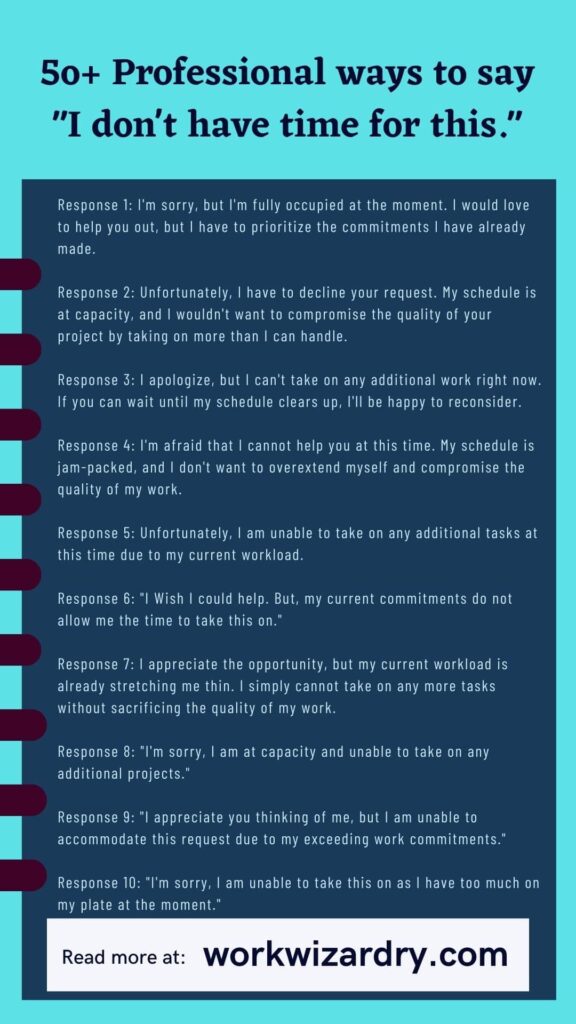As professionals, we are constantly juggling a multitude of tasks, responsibilities, and deadlines.
In such a fast-paced work environment, it is inevitable that we will encounter situations where we simply do not have the bandwidth or resources to take on additional projects or tasks.
However, communicating this message in a professional and tactful manner can be a daunting task for many.
How do you politely decline a request without causing offense or damaging relationships? How do you communicate your unavailability without appearing disinterested or unhelpful?
In this blog post, we will explore the art of professionally saying “I’m too busy for this,” “I’m not doing that,” “That’s not my priority,” “I don’t have the resources for this,” “I’m not qualified for this,” and “I can’t help with that.”
We will provide insightful tips and tricks on how to effectively communicate your limitations without compromising your professionalism or relationships. So let’s dive in and learn how to professionally say I’m too busy for this with 50+ Example responses:
Table of Contents
How to professionally say I’m too busy for this?
Here are 50+ example phrases on How do you professionally say “I’m too busy for this”
Response 1: I’m sorry, but I’m fully occupied at the moment. I would love to help you out, but I have to prioritize the commitments I have already made.
Response 2: Unfortunately, I have to decline your request. My schedule is at capacity, and I wouldn’t want to compromise the quality of your project by taking on more than I can handle.
Response 3: I apologize, but I can’t take on any additional work right now. If you can wait until my schedule clears up, I’ll be happy to reconsider.
Response 4: I’m afraid that I cannot help you at this time. My schedule is jam-packed, and I don’t want to overextend myself and compromise the quality of my work.
Response 5: Unfortunately, I am unable to take on any additional tasks at this time due to my current workload.
Response 6: “I Wish I could help. But, my current commitments do not allow me the time to take this on.”
Response 7: I appreciate the opportunity, but my current workload is already stretching me thin. I simply cannot take on any more tasks without sacrificing the quality of my work.
Response 8: “I’m sorry, I am at capacity and unable to take on any additional projects.”
Response 9: “I appreciate you thinking of me, but I am unable to accommodate this request due to my exceeding work commitments.”
Response 10: “I’m sorry, I am unable to take this on as I have too much on my plate at the moment.”
Response 11: “I am honored that you asked, but I must regretfully decline due to my current workload.”
Response 12: “I appreciate the offer, but I cannot commit to this project at this time due to my prior commitments.”
Response 13: My plate is overflowing with projects at the moment, so I won’t be able to fit this in. I suggest finding someone else who can accommodate your request.
Response 14: Regrettably, I’m already up to my neck in work and can’t take on anything else. Maybe next time, try not to wait until the last minute to ask for help.
Response 15: I’m afraid that I’m fully booked with work and won’t be able to squeeze this in. Please understand that my time is limited and I need to prioritize my existing responsibilities.
Also read: How to professionally say that’s not my job, this is your job or do your job? (100+ example phrases)

How do you professionally say I don’t have time for this?
Here are a few professional ways to say I don’t have time for this:
1. “I apologize, but I am currently unable to devote time to this task. Please let me know if I can help in any other way.”
2. “I regret that my current workload does not allow me to dedicate time to this task. Is there anyone else who can assist you?”
3. “I’m afraid I cannot prioritize this task at the moment due to other commitments. Can we discuss this at a later time?”
4. “I apologize, but my schedule is fully booked at the moment. Can we schedule a time to discuss this in the future?”
5. “Unfortunately, I have a tight deadline to meet, and I won’t be able to give this task the attention it deserves. Can someone else help you with this?”
6. “I’m sorry, but I am unable to fit this into my schedule. Can we work on this at a later date?”
Related: How to say none of your business politely? 60+ professional and sarcastic responses
How do you professionally say I’m not doing that?
These are some polite ways to say I’m not doing that:
1. “I regret that I am unable to accommodate this request, but I am happy to discuss alternative solutions.”
2. “I apologize, but my skills are not a good match for this task. Perhaps someone else in the team could assist?”
3. “I’m afraid I cannot commit to this request at the moment, but I would be happy to refer you to someone who can help.”
4. “I understand the importance of this task, but unfortunately, I am not the right person to handle it. Can we explore other options?”
5. “I regret that I am unable to fulfill this request. Can we discuss the reasons why and explore alternative solutions?”
6. “I’m sorry, but I am not comfortable with the task requirements. Can we find someone else who is better suited for this?”
How do you professionally say That’s not my priority?
The following is a list on how to tell that’s not my priority in a polite and professional manner:
1. “I understand that this is not my primary focus, however I am willing to assist where feasible.”
2. “I understand the urgency of this matter, but my current priorities prevent me from taking on this task. Can we revisit this at a later date?”
3. “I apologize, but this task is not in line with my current objectives. Can we discuss your needs and how we can address them?”
4. “I appreciate the importance of this task, but it is not something I can prioritize at the moment. Can we find someone else to assist?”
5. “I’m sorry, but I have to focus on other tasks that have a higher priority at the moment. Can we talk about this later?”
6. “I regret that this task is not a priority for me right now. Can we explore ways to streamline the process or delegate it to someone else?”
Related: How to professionally say that sounds like a you problem? (30 polite responses)
How do you professionally say I don’t have the resources for this?
These are a few nice ways to say I don’t have the resources for this:
1. “I apologize, but I currently do not have the necessary resources to complete this task. Please let me know if I can help in any other way.”
2. “I apologize, but I currently lack the resources to take on this task. Can we explore alternative solutions?”
3. “I’m afraid I don’t have the necessary resources to complete this task. Can we find someone else who can help?”
4. “I understand the importance of this task, but I don’t have the budget or the tools to take it on. Can we discuss other options?”
5. “I’m sorry, but I cannot complete this task due to resource constraints. Can we revisit this when resources become available?”
6. “I regret that I don’t have the resources required for this task. Can we explore ways to prioritize or scale down the project?”
How do you professionally say I’m not qualified for this?
Here are some professional phrases and responses to say I’m not qualified for this:
1. “I regret that I am not qualified for this task, however I am happy to discuss other options.”
2. “I apologize, but I don’t have the necessary skills or experience to handle this
3. “I regret that I don’t have the expertise needed to tackle this task. Can we find someone who has the necessary qualifications?”
4. “I appreciate the opportunity, but I don’t have the credentials or knowledge required for this task. Can we explore other options?”
5. “I’m sorry, but I am not the best fit for this task due to my lack of qualifications. Can we find someone else who can help?”
6. “Unfortunately, I don’t have the necessary training or experience for this task. Can we find an expert in this area to assist?”
How do you professionally say “I can’t help with that”?
The following are some polite ways to say I can’t help with that:
1. “I apologize, but I am not able to provide assistance with this task. Please let me know if I can help in any other way.”
2. “I apologize, but my expertise does not align with the requirements of this task. Can we find someone else who can help?”
3. “I’m afraid I am not equipped to handle this task. Can we find someone else who can assist you?”
4. “I’m sorry, but this task falls outside the scope of my responsibilities. Can we explore other solutions or find someone else who can help?”
5. “I regret that I cannot provide assistance with this task. Can we explore other options or find someone with the necessary expertise?”
Related: 20 Professional ways to say No to extra work hours
How do you professionally say “I don’t have time for this right now”?
These are some ways to say I don’t have time for this right now politely and professionally:
1. “I understand the urgency of the matter, but I have another commitment at the moment. Can we schedule a time to discuss this later?”
2. “I’m sorry, but I have other commitments that require my immediate attention. Can we schedule a time to discuss this later?”
3. “I appreciate the urgency of this matter, but I’m currently unavailable to assist. Can we revisit this when I have more time?”
4. “I apologize, but my current workload does not allow me to devote time to this task. Can we find someone else who can help?”
5. “Unfortunately, I cannot prioritize this task at the moment due to my schedule. Can we schedule a time to discuss this in the near future?”





